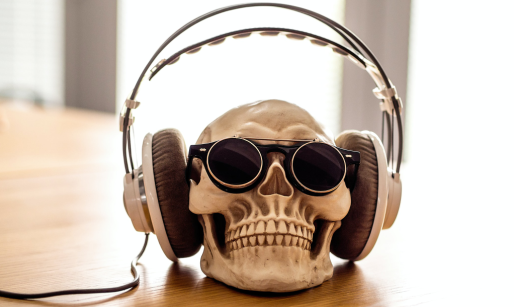Music in Recovery: The Perils of Music Listening

Few of us call ourselves musicians, but in western culture, we are all expert music listeners. Music listening can be a good tool, but it can also be a dangerous tool in recovery. I’m a board-certified music therapist who works in addiction treatment centers, but I’m also in long term recovery. In this blog post, I’d like to share why anyone in early recovery needs to carefully curate their music playlists.
Music Can Transport You Back in Time and Space
You’ve had this happen before: you were sitting somewhere, and a song came on. It could have been on the radio in your car, or in a public area like a mall, restaurant, or store. Suddenly, you were no longer in that physical place, but somehow the song transported you back in time and space. The song triggered a memory that you did not choose to recall but was now in the midst of. Sometimes, it’s a pleasant memory, sometimes it’s inert, and sometimes it’s painful. In all three cases, you were no longer present, and you didn’t consciously ‘do’ anything to make it that way.
In addition, there is a connection in your brain between music, emotion, and behavior. So, that soundtrack of your (or your client’s) partying days? Your brain has linked picking up and using with that soundtrack. Just hearing the song can trigger a craving. This was discovered accidentally during research on the brain by addiction medicine pioneer Dr. Mark Gold. He noticed that the MRI tech was playing “Cocaine” by Eric Clapton, and the song was triggering cravings in the patients when the song got to the chorus. They could see the connection thanks to the MRI machine.
Reliving the Glory Days
In addition, many of us suffer from euphoric recall, where we look back on some of our ‘glory days’ with rose-colored lenses. We only remember the good times, and forget the hell we went through, or put others through at the expense of those good times. We think, “It wasn’t so bad…”
Since music can trigger cravings and euphoric recall, it’s important to the person in early recovery to explore the universe of music out there to listen to, and ‘hit pause’ on their preferred party playlists for a while. The good news? The connection between music, emotion, and behavior wanes over time. Neuroplasticity teaches us that nerves that fire together, wire together, and those that don’t, atrophy. I’m happy to report that my party playlists today don’t trigger the emotional and physical reactions they did when I was in early recovery.
For some of us, recovery is the biggest mountain we’ve ever climbed, and the toughest task we’ve ever taken on. Music can be a powerful tool and ally when used correctly. When used incorrectly, it can accidentally undermine the hard work we’ve put into staying sober one day at a time. In the next couple of blog posts, I’ll share a little more about how music aids in the recovery journey, and why it is a VITAL TOOL in your toolbox!
Want to learn more? Check out the Music In Recovery Guide and learn how to prescribe your own music in recovery.

